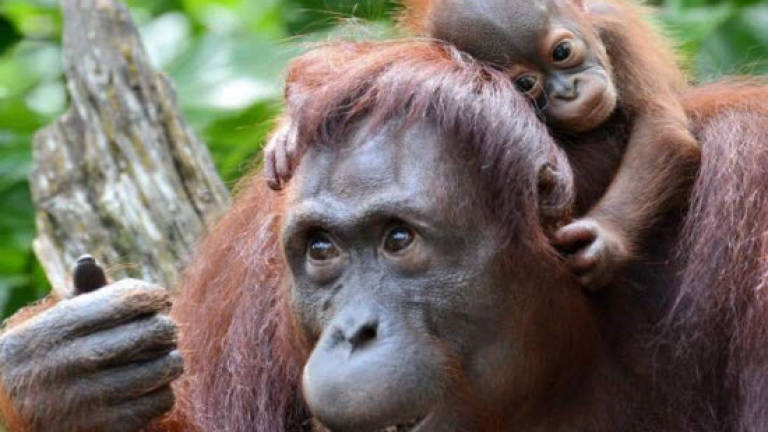Bornean orangutan one step away from extinction


HONOLULU: Malaysia may lose its iconic species - the Bornean orangutan - as it is now one step away from extinction, revealed International Union for Conservation of Nature (IUCN) World Conservation Congress 2016.
IUCN Red List assessment, which studies the number of species in the wild, revealed that the Bornean orangutan (Pongo pygmaeus) has moved from Endangered to Critically Endangered.
Critically Endangered is the highest risk category assigned by the IUCN Red List that identifies species that are in all probability already extinct but for which confirmation is required; for example, through more extensive surveys being carried out and failing to find any individuals.
Wildlife Conservation Society Malaysia director Dr Melvin Gumal who also wrote the IUCN Red List report told theSun that the orangutans are the rarest subspecies in the world.
"Across Borneo, the loss of orangutan numbers are big enough to push their status to the 'critically endangered' category. They often are killed when they lose their habitats during forest clearing for plantations, young orangutans are sought as exotic pets and at rare occasions they are consumed by the locals as protein source," he said.
Dr Melvin Gumal was honoured in 2014 and awarded the Whitley Award for Conservation in Ape Habitats, one of eight prizes by the Whitley Fund for Nature, for his efforts in protecting the great apes.
However, all may not be lost for these giant apes. Dr Melvin says if the killing stops, they will have a chance to survive.
"We don't want to lose them like the Sumatran rhinoceros which are now extinct in the wild of Peninsular Malaysia. Conservation efforts need to be stepped up by increased patrolling and habitat protection with the support of locals," he added.
He said the orangutan population is declining sharply as the forests they live in are turned into oil palm, rubber or paper plantations, and others are killed by humans.
“This is the first time in many decades that we have a clear understanding of Bornean orangutan population trends,” said Erik Meijaard, one of the assessors of the species who is also a member of the IUCN Species Survival Commission’s Primates Specialist Group and director of Borneo Futures, an initiative dedicated to preserving Borneo’s biodiversity.
“As orangutans are hunted and pushed out of their habitats, losses to this slow-breeding species are enormous and will be extremely difficult to reverse.”
The Red List says that the two major reasons why the orangutan population are in sharp decline are destruction, degradation and fragmentation of their habitats, and hunting.
"Recurrent forest fires, especially in peat forests, cause additional sharp declines about once every decade. Bornean orangutans decreased by more than 60% between 1950 and 2010, and a further 22% decline is projected to occur between 2010 and 2025. Combined, this equates to a loss of more than 82% over 75 years, 1950–2025," it says.
IUCN Red List showed four out of six great apes are one step away from extinction including the Eastern Gorilla, Western Gorilla and Sumatran orangutan.